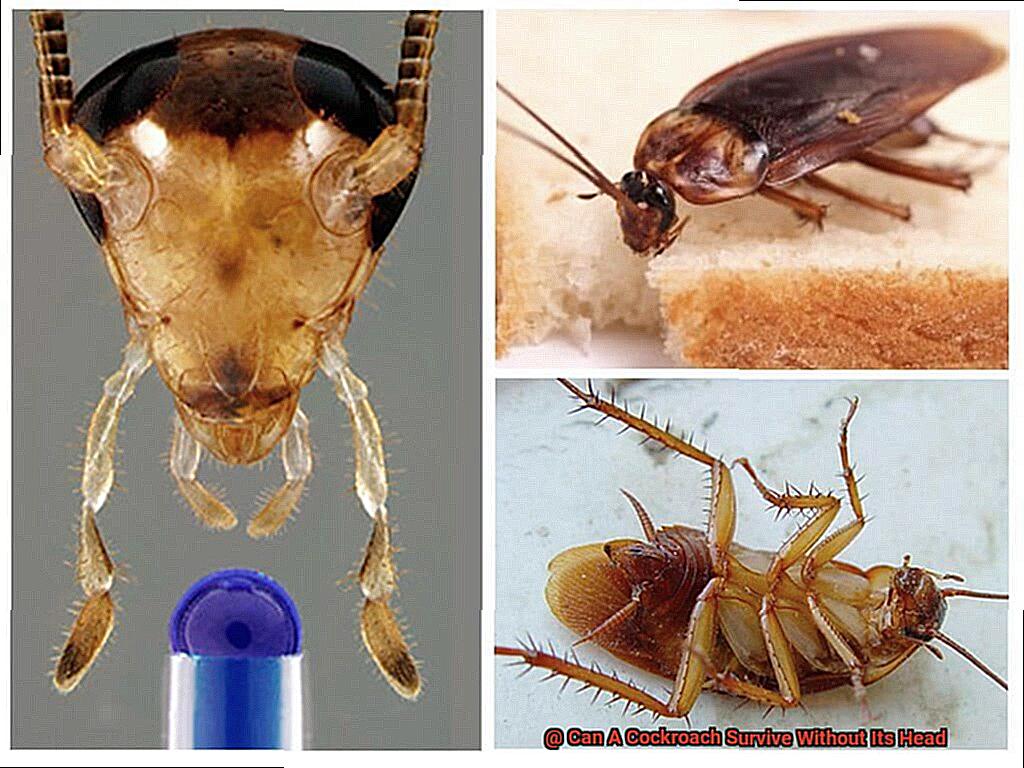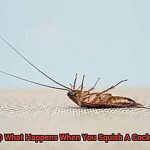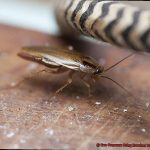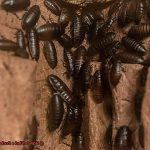Have you ever wondered if a cockroach could survive without its head?
It may sound like a creepy horror movie plot, but it’s actually a fascinating scientific inquiry that has puzzled researchers for years. Cockroaches are known for their ability to endure extreme conditions, from surviving in scorching temperatures to going without food for weeks.
But what happens when they are decapitated? Can they still survive?
The answer lies in the cockroach’s unique physiology. Unlike humans and other animals, their organs and tissues receive air and nutrients not only from their head but also from tiny air holes along their body segments.
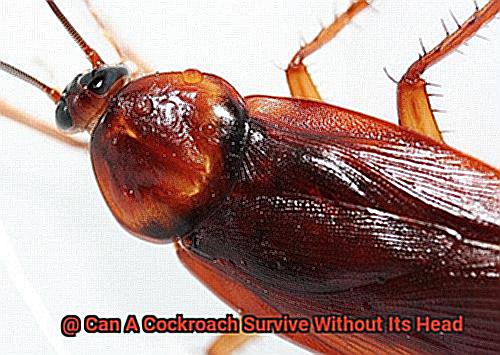
Plus, their nervous system is distributed throughout their body, allowing them to perform basic functions such as breathing and digestion even without a head. Some people have even claimed that cockroaches can live without heads for weeks or even months.
So, let’s delve into the fascinating world of cockroach physiology and discover just how tough these tiny insects can be.
What Is a Cockroach?
Contents
- 1 What Is a Cockroach?
- 2 How Does a Cockroach Survive Without Its Head?
- 3 What Happens When a Cockroach Loses Its Head?
- 4 Can Cockroaches Survive Without Their Heads for Long Periods of Time?
- 5 What Are the Implications of a Headless Cockroach?
- 6 How to Handle an Infestation of Headless Cockroaches
- 6.1 Identify the Source of the Infestation
- 6.2 Eliminate Hiding Spots
- 6.3 Take Action Against Remaining Cockroaches
- 6.4 Bait stations are a popular option because they contain a slow-acting poison that cockroaches eat and then take back to their nest, killing off the entire colony. Insecticides can also be effective, but they should be used with caution as they can be harmful to humans and pets. Traps can be useful for monitoring the infestation and capturing individual cockroaches.
- 6.5 Maintain Regular Cleaning Habits
- 6.6 Call in Professional Help
- 7 Conclusion
These creepy crawlies belong to the order Blattodea, with over 4,500 known species worldwide. Cockroaches have a distinct appearance, with a flat, oval-shaped body and six legs, and two antennae that help them navigate their surroundings.
These nocturnal insects are most active at night and can be found hiding in dark places like cracks and crevices during the day. One of the most impressive things about cockroaches is their ability to survive in extreme conditions.
They can go without food for a month and survive for a week without water. Their adaptability to different environments makes them common pests in homes, restaurants, and other buildings.
But did you know that cockroaches can also survive without their heads? These hardy insects have an open circulatory system that doesn’t rely on their head to pump blood throughout their body, and instead use tiny tubes called tracheae to carry oxygen directly to their tissues.
They also have a decentralized nervous system that allows them to function even after losing their heads. However, this is not a painless process for the cockroach and can cause them to go into shock and experience convulsions before passing away.
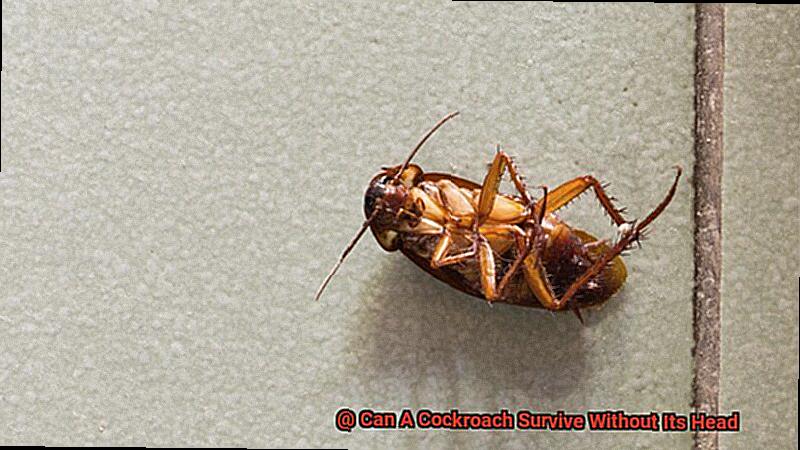
Cockroaches are attracted to warm, moist environments, which is why they are commonly found in kitchens and bathrooms. While they are notoriously difficult to control, prevention and appropriate control measures can help avoid infestations.
However, if you suspect a cockroach infestation in your home or building, do not hesitate to contact a pest control specialist for appropriate measures.
How Does a Cockroach Survive Without Its Head?
These creepy crawly insects are known for their distinctive appearance, nocturnal habits, and remarkable survival skills. One of their most unique abilities is the ability to survive without their heads.
You may wonder how this is possible? Well, let me tell you that it all comes down to their specific nervous and circulatory systems.
Cockroaches have a decentralized nervous system that allows them to control certain functions through nerve cells located throughout their bodies. Even without their heads, they can still breathe and excrete waste through spiracles.
When a cockroach loses its head, it begins to produce signals that cause its legs and wings to move involuntarily for several hours or even days after decapitation. This involuntary movement is caused by the release of neurotransmitters that stimulate muscle contractions.
However, as amazing as this may seem, a cockroach’s ability to survive without its head has limits. Since their heads control their feeding behavior, they cannot eat or drink anything and eventually die of starvation or dehydration within a week or two.
Additionally, without a head, they are unable to regulate their body temperature and are susceptible to overheating or freezing to death. So, while it’s true that cockroaches are incredibly resilient creatures with unique survival skills, prevention is still better than cure when it comes to pest control.
Keeping homes and buildings clean and monitoring pest activity can help prevent infestations in the first place.
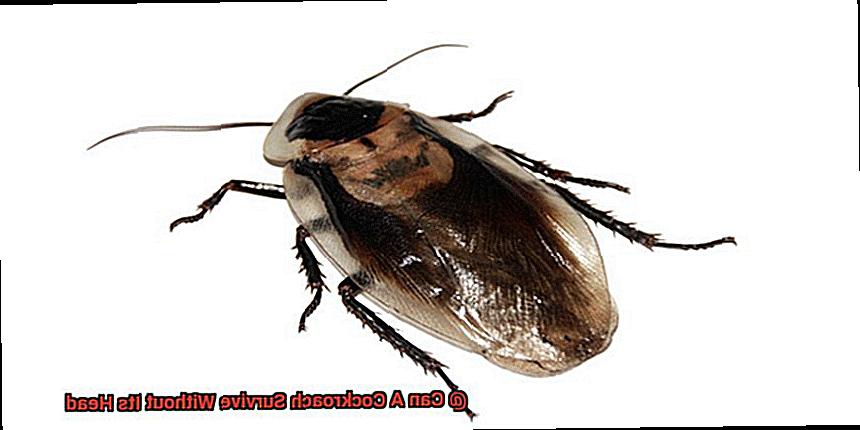
What Happens When a Cockroach Loses Its Head?
These creepy crawlies have some remarkable survival skills when it comes to decapitation. When a cockroach loses its head, its body goes into shock, and its muscles begin to contract and relax as a result of nerve cell signals.
This can last for a few minutes, leading to what scientists call “the death dance.” However, don’t let this peculiar behavior fool you – the cockroach can live up to several weeks without its head.
One significant reason for this is because cockroaches have an open circulatory system that allows their blood to flow freely throughout their body cavity. Without a functioning head, the cockroach can keep going for a long time.
But before you get too excited, keep in mind that the headless cockroach will eventually die from starvation or dehydration if it’s unable to eat or drink without its mouth and head intact. Without its head, the cockroach cannot groom itself properly, which may lead to fungal infections and other health problems.
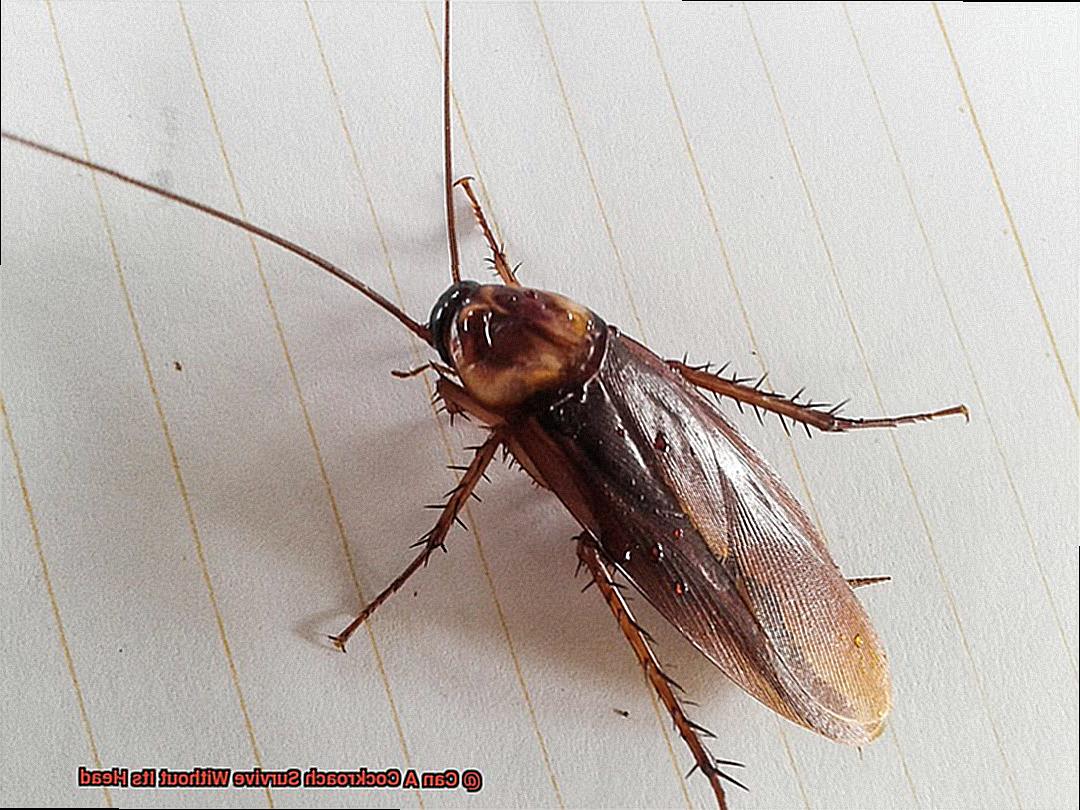
Additionally, since the head contains the brain and sensory organs, it becomes difficult for the cockroach to detect danger or respond to stimuli. As a result, it becomes vulnerable to predators and other threats.
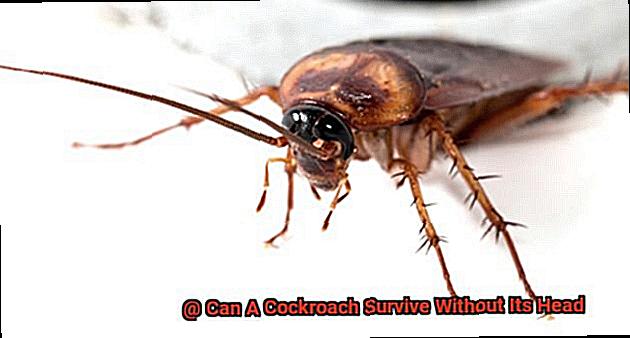
Remarkably, after losing its head, a cockroach can still mate or lay eggs. Hormones produced in the abdomen regulate these behaviors rather than the brain.
However, these offspring will not survive long without a mother’s care. While it’s intriguing that cockroaches can live for a short time without their heads, decapitation is not an effective long-term pest control solution.
Can Cockroaches Survive Without Their Heads for Long Periods of Time?
Cockroaches are like tiny superhumans with an incredible ability to survive in harsh environments.
And one of their most amazing feats is their ability to live without their heads for a short period of time. But how do they manage it?
It’s all thanks to their unique anatomy. Cockroaches have a decentralized nervous system, which means that even if their head is removed, their body can continue functioning for a while.
They have ganglia nerve clusters scattered throughout their bodies, allowing them to keep moving around for several hours or even days after decapitation. But don’t be fooled by their headless acrobatics – surviving without a head doesn’t mean they can live forever.
Without a mouth, cockroaches are unable to eat or drink and will eventually perish from dehydration or starvation. They also cannot groom themselves without a head, increasing the risk of infection.
The best way to prevent infestations is by keeping your home clean and sealing off any entry points.
What Are the Implications of a Headless Cockroach?
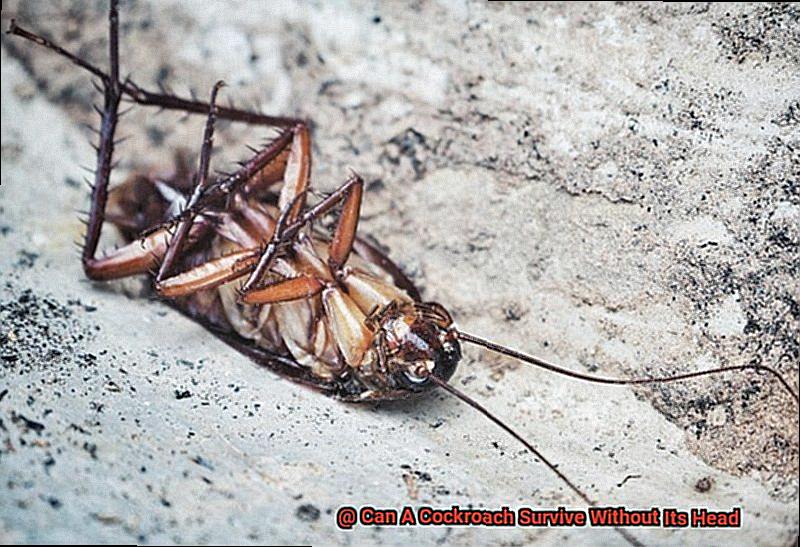
When it comes to survival, cockroaches are in a league of their own.
It may sound like something out of a horror movie, but the fact is that headless cockroaches can live for several weeks. This is because they have a decentralized nervous system that allows them to still move and react to stimuli, even without their main brain located in their head.
But don’t be fooled by their resilience – without their head, these creepy crawlies cannot eat or drink. Their mouthparts are located in their head, which means they need it to consume food and water.
Ultimately, this leads to their demise due to dehydration and starvation. However, the ability of female cockroaches to lay eggs even after mating is not affected by the loss of their head.
They can store sperm in their body for several months and use it to fertilize eggs. This means that even headless female cockroaches can contribute to the population.
Unfortunately, headless cockroaches also pose potential health risks. They can carry disease-causing pathogens on their body and continue to contaminate food and surfaces with their feces.
This highlights the importance of keeping your home clean and dry to prevent infestations and control populations.
6JO87mvtEic” >
How to Handle an Infestation of Headless Cockroaches
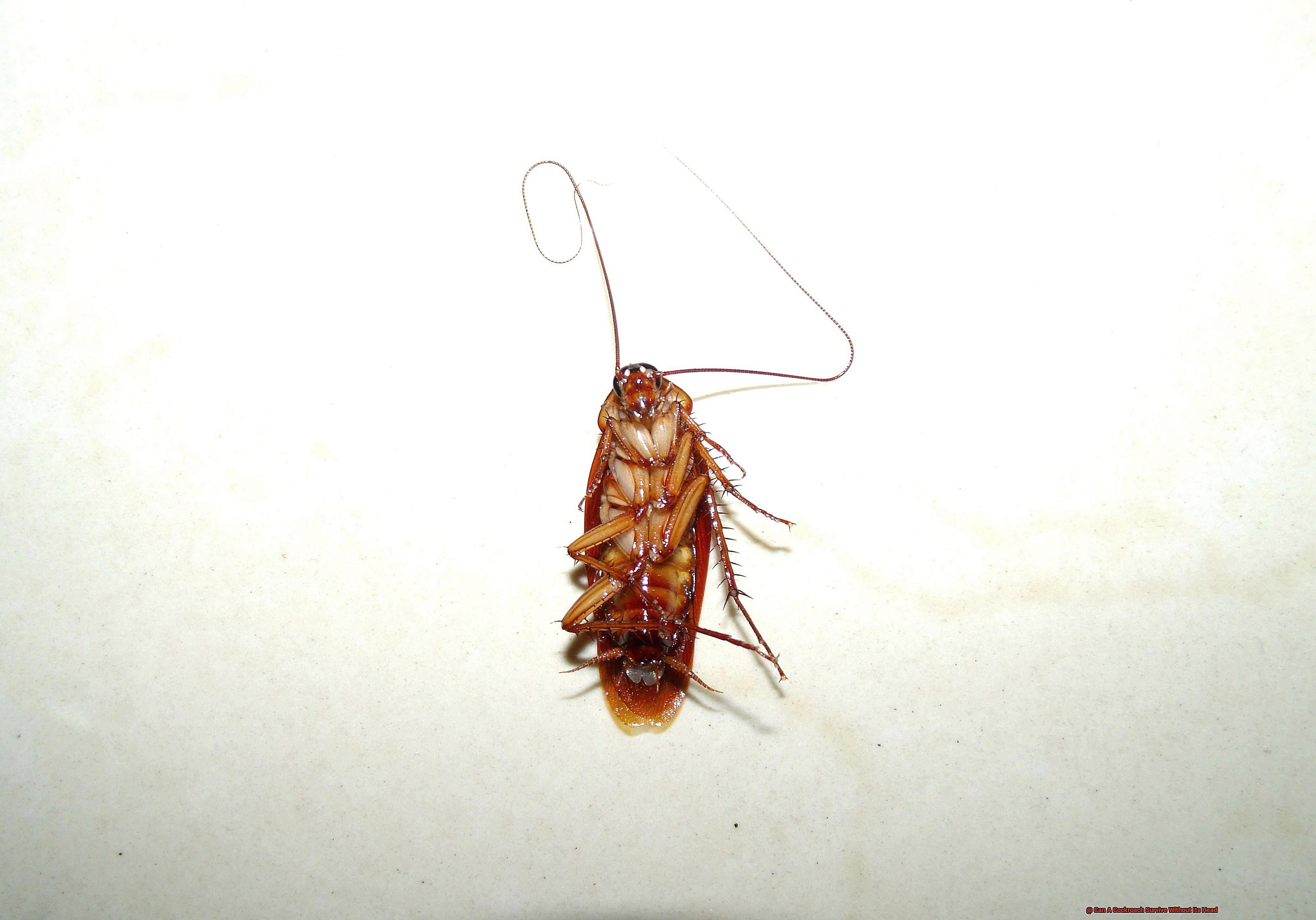
Cockroaches are notorious for being resilient and difficult to eliminate. But with a little effort, you can take steps to control an infestation and prevent future problems.
Identify the Source of the Infestation
The first step in handling an infestation of headless cockroaches is to locate the source of the problem. Cockroaches are attracted to food and moisture, so keeping your home clean and dry is crucial. Clean up any spilled food or drinks immediately, fix any leaks or standing water, and seal cracks and crevices in walls, floors, and cabinets with sealants.
Eliminate Hiding Spots
Next, it’s important to eliminate any hiding spots for the cockroaches. Seal gaps around doors and windows with door sweeps and weather stripping. This makes it harder for the cockroaches to find places to hide and breed.
Take Action Against Remaining Cockroaches
Once you have addressed the source of the infestation and eliminated hiding spots, it’s time to take action against the remaining cockroaches. Bait stations, insecticides, and traps are all effective methods to get rid of these pests.
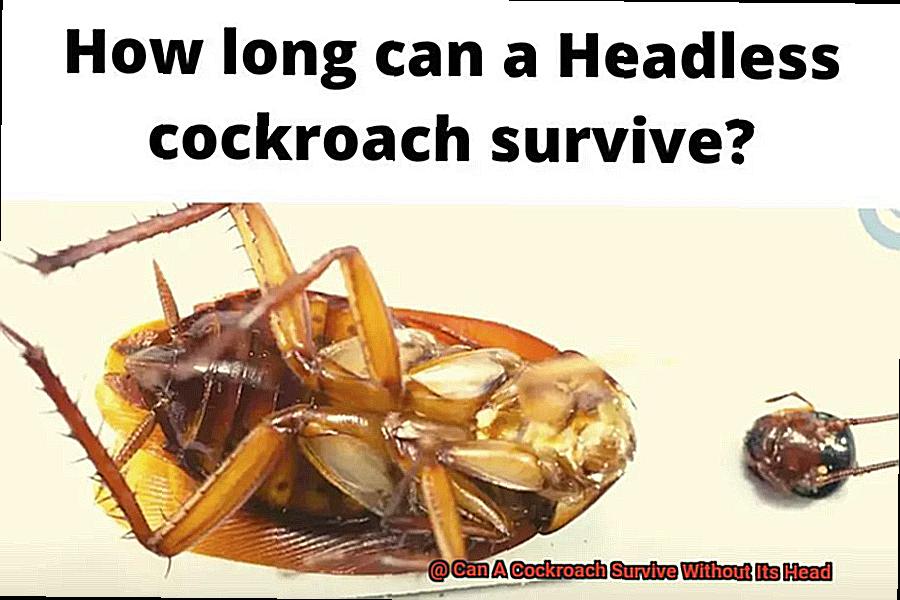
Bait stations are a popular option because they contain a slow-acting poison that cockroaches eat and then take back to their nest, killing off the entire colony. Insecticides can also be effective, but they should be used with caution as they can be harmful to humans and pets. Traps can be useful for monitoring the infestation and capturing individual cockroaches.
Maintain Regular Cleaning Habits
In addition to these methods, it’s important to maintain regular cleaning habits to prevent future infestations. Keep your kitchen clean and free of crumbs and spills, store food in airtight containers, and take out the trash regularly.
Call in Professional Help
If you have tried these methods and still have an infestation of headless cockroaches, it may be time to call in a professional pest control company. They will have access to stronger pesticides and specialized equipment that can help eliminate the problem more effectively.
In conclusion, dealing with an infestation of headless cockroaches requires patience and persistence. By identifying the source of the problem, eliminating hiding spots, using safe pesticide products, maintaining regular cleaning habits, and calling in professional help if necessary, you can effectively control an infestation of headless cockroaches in your home.
Also Read: Do Cockroaches Play Dead? – All About Roaches
Conclusion
The question of whether a cockroach can survive without its head is intriguing, and the answer is equally fascinating.
These resilient insects have a unique physiology that allows them to live for weeks or months without their heads. This is due to their decentralized nervous system and open circulatory system, which enables their organs and tissues to get air and nutrients from tiny air holes along their body segments.
Despite this impressive feat, decapitation is not a long-term pest control strategy. Headless cockroaches cannot groom themselves properly, which increases the risk of disease transmission.
Additionally, they are unable to regulate their body temperature, making them susceptible to overheating or freezing to death. To prevent infestations in the first place, it’s essential to keep houses and buildings clean while sealing off entry points.
If you suspect a cockroach infestation in your home, contacting a pest control specialist is crucial for taking the right steps. Dealing with an outbreak of headless cockroaches requires patience and perseverance.
To effectively control an infestation, start by identifying the source of the problem and removing any hiding spots. Safe pesticide solutions can also be useful in controlling these pests.
In conclusion, while it’s true that cockroaches can survive without heads for some time due to their unique physiology, it’s not a viable long-term solution for controlling infestations.

